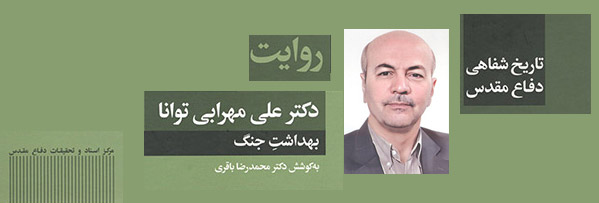Medal and Leave - 5
11 notes from and Iraqi captive
Divine aid, in its true sense, means the Great God's support of His sincere servants through unseen forces in the heavens and the earth without human awareness. That is, the same strong and resilient barriers that have protected the Islamic Revolution in the past and present from destructive and devastating currents; and I have been involved in such situations.The Unique Position of the Iranian Oral History Website
The topic of "oral history" has only recently become a significant concern among historians in Iran, sparking numerous discussions about its importance and various dimensions. The necessity of addressing this subject has now become evident—especially in today’s world, where, for various reasons, there is an unprecedented and often covert battle between competing narratives.A Brief Reference
It is generally preferable to have direct and immediate knowledge of an event rather than rely on indirect information. This preference stems from the trustworthiness and accuracy of firsthand experience. When it comes to specific historical events, however, the importance of direct knowledge becomes even greater. This is especially true because such information is meant to be passed down to future generations, helping ...Clarifying the Current Situation; Perspectives of the Oral History Website
The definition of a “journalist” and the profession of “journalism” is not limited to simply “gathering,” “editing,” and “publishing breaking news.” Such an approach aligns more with the work done in news agencies and news websites. But now, after years of working in the field of books for various news agencies, newspapers, and magazines, when I look back, I realize that producing and compiling content for ...The Oral History Weekly; A New Window
The ups and downs of everyday life sometimes cause me to forget certain duties and missions, including oral history—especially its form related to the Holy Defense! But when Wednesday comes and I receive an issue of the Oral History weekly journal, a new window opens before me. Each title, article, viewpoint, and memory becomes a chapter for reflection in that realm. Although the scientific aspect of the journal is useful to me, its psychological value improves my mood even more.The Days Long Past of this Tale
I go back to the earliest “oral” stories—when we played aunty games in the courtyard, in the corner of the porch. One day, quite unintentionally, I overheard a conversation between Mom and Miss. Balakhanem, our neighbor from years ago. At that time, there were barely enough television channels to count on one hand, and I remember that the series Madame Kouri was broadcast on Wednesdays.Oral History’s Deadlocks
Today, oral history is regarded as one of the research tools attracting the attention of contemporary historians and even interdisciplinary studies. Just as these sources can be trusted, the opposite is also true. Oral history researchers face challenges during their investigations that sometimes lead to dead-ends in analyzing events. Although some oral historians, after years of interviewing, do not consider oral history data alone as fully accepted, they strive to present ...Structure of Oral History Weekly
Oral history has become one of the most important fields of historical study over the past two decades. Various institutions and organizations, including non-governmental groups and individuals, have actively contributed to its development. Publishing 689 weekly issues focused on specialized topics in history—particularly war history—by the Arts Center is no small feat.Towards the Thousandth Issue
The specialized Oral History Weekly, with the publication of its 700th issue, has taken a significant step in recording and documenting the living narratives of contemporary Iranian history. This weekly, recognized as one of the authoritative references in the field of oral history, has succeeded through continuous effort and scientific accuracy in preserving an important part of the memories and historical events of the country, especially regarding two pivotal events:Most visited
- Medal and Leave - 3
- In Memory of the Son of the Soil; A Clear Picture of Patience and Freedom
- A Statistical Glance at the Oral History Archive of Iran
- A Memory of an Army Aviation Pilot
- Medal and Leave - 4
- The 370th Night of Memories – 1
- The Oral History Website and Its Position
- Towards the Thousandth Issue
Monafeghin: A New Deception
July-August 1989Following the discussions around the asylum of Iraqi prisoners of war in Iran during peace negotiations, the Iraqi side, not wanting to fall behind, launched their own campaign to offer asylum. At the outset, they attempted to attract prisoners by making grand promises ...
Supports from Guilds and Bazaars peaple
Memoirs of Haj Hossein FathiOur base of operations had become the Saheb al-Zaman Mosque in the Kamp-Lou neighborhood of Ahvaz. With the assistance of Brother Khani and his companions, we began preparing hot meals and sending them to the frontlines. We ourselves, along with several fellow merchants from the bazaar, entered the conflict zone, bringing warm clothing, ...
War Health
Narrated by Dr. Ali Mehrabi TavanaThe book War Health is an oral narrative by Dr. Ali Mehrabi Tavana, a commander in the health sector during the Sacred Defense era. This book, in the form of six chapters and twenty conversation sessions, covers the narrator’s life from birth to the end of the [Iranian] Eight-Year War. The interviews and compilation of the book were conducted ...
Agents in Search for the Fighter
[Interview with Fatemeh Amir Hosseini 2019/03/08.] The agents were always at our house. They would come day and night, turn the house upside down, mess up the library. For example, I remember we had the book Eqtesadona (Our Economy) by Mr. Sadr, and Imam Khomeini’s Resaleh (Treatise). We had many books—they would pack some of them up and take them away. Then the next day, they would knock again. Back then, our house was on Ghiyasi Street. We were really distressed.








